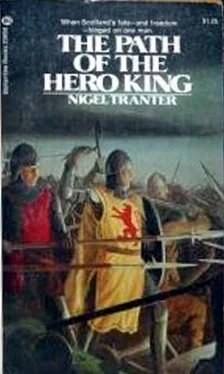Yes. For that I am grateful. To you! Scarce to Edward, who kept them like cooped fowl for months after his father died. That any Christian prince could so act…! But-what is my duty, William?
Towards my wife and daughter? I ask you-what is my true duty? I am a man, a husband and father, as well as a king. As you are a man as well as a bishop, as you have just said. I have set my throne before my wife. No-not my throne; my realm, my people.
The freedom of Scotland before her freedom. And that of the child of
my loins. And cursed myself for it every day of my life! What is my
duty, man? You know your duty, Robert You have done it And, I pray
God, will continue to do it. You are King of Scots. I anointed you that day, at Scone. You are not as other men. This your burden you must carry, grievous as it is. All men know it Elizabeth knows it, and would not have you fail in it. A kings is no mere title or honour, as is earl or knight A king is wed to his people, first. You know it I know it. Wearily the other nodded.
But, at times, I … I hope … weakly. That I might be spared this.
Bruce straightened up.
But enough of this. You came because of todays parliament?
Yes.
To support you in it. For I am still, in name, your Chancellor of the realm. And the Chancellor should conduct the business of a parliament, under the monarchs presidency. I cannot remain Chancellor-but at least I can support you at the opening of this, your first. This I had to do.
It was kindly thought of. I am grateful. I had thought to use another acting-Chancellor. Nicholas Balmyle was formerly that.
But now, as bishop, and administrator of your diocese as well as his own Dunblane, he is better as the realms Treasurer. I had intended to appoint Master Bernard de Linton, my secretary, as acting-Chancellor. He is young, able, trustworthy, and of nimble mind. And loyal. Though of lowly rank. Shall I so appoint him, in your name, think you?
No, Sire. Not acting-Chancellor. Make him Chancellor of the Kingdom, in truth. An excellent choice. Better than Balmyle, indeed-who, though sound, has his limits. I wish to be relieved of this office. It is folly for me to remain in it, even in name. For too long there has indeed been no Chancellor. Give Bernard de Linton the seals of office.
He will serve Scotland well.
Mmmm. It is a big step, that. For one so humbly placed. There are those who will be envious. It is best to be a churchman, yes, a clerk and man of learning. But many others higher placed may demur. And since many must take instructions and even commands from the Chancellor, it would be unwise to offend such prelates.
Taking instruction in your name, yes. But in the name of the Vicar of Mordington …!
True. Then we must use our wits. Between us, we can arrange it better, surely-King and Primate! Bernard is worthy of a promotion.
It was on my suggestion that Nicholas Balmyle offered him for your service. He must be raised in rank. Lamberton permitted himself a wintry smile.
A mitred abbot? There is one abbey within my jurisdiction that is a thorn in my flesh-Arbroath! It is one of the richest in the land-yet Abbot John is for the English, as you well know. He cocks his mitre under the protection of the English garrison of Dundee! And refuses to pay his dues to my treasury here. See you how my mind works, Robert?
Ha! Appoint Master Bernard Abbot of Arbroath? In place of this John.
One of the most senior abbacies in Scotland …
And let Master Bernard, who is an able chief, and with his own ambitions no doubt, desire to get his hands on the revenues thereof, as well as the office! So, I think, we shall soon see notable efforts to oust the English from Arbroath and Dundee! To the benefit of all.
Sakes, man-here is a ploy indeed! Bruce chuckled.
Your wits have rusted nothing in your English prison, I vow! May I so announce to this parliament? The new Abbot of Arbroath to be Chancellor of the Kingdom, in your room? And Abbot John dismissed.
When better to announce it, Sire? Although I had better have a word with Master Bernard first!
To be sure. I will send for him …
So thereafter, when the King led the glittering mounted cavalcade through the rainwashed streets of the ecclesiastical metropolis, its own master, to the astonishment of all, rode at his side, clad in most magnificent episcopal canonicals hastily resurrected from secret storage for the occasion. If Lamertons presence stole much of the limelight, in consequence, Bruce was the last to complain.
At the mighty cathedral, the largest in Scotland, all had been prepared with much care-though hardly for its own Bishops presence.
Certain damage had been caused by the English invaders but this was
hidden behind evergreens and other decoration. The chancel-screens
dividing the choir and high altar from the vast nave were further
reinforced with more greenery and heraldic painted canvas, so as
decently to shut off the holy parts from the rest. The nave itself,
not normally seated, was now furnished with a great variety of chairs,
benches, stools and forms, arranged in groupings and order to seat the
varying degrees and status of the participating commissioners-and such
was the scale of the place that there was still a large area at the
west end available for onlookers. A dais had been erected at the
chancel steps, for the throne, the Chancellors table, the clerks
desks, and so on. Immediately below were seats for the great officers
of state, and flanking them left and right were special stalls for the
earls and bishops. Facing the dais were the three large groupings,
already filled as the trumpets blared for the royal arrival-the
estates of the Church, the barons and the burghs. Behind, the spectators enclosure was packed. The lofty galleries of triforium and clerestories were today rivalling the splendour of such stained-glass windows as had not been smashed, in the kaleidoscopic colours of the ladies who thronged them.
Hidden choirs in the chancel sang anthems as the King of Arms and his heralds led in the King of Scots and his great entourage.
Three men paced immediately behind him-James, the High Steward, Edward, Earl of Carrick, and William, Bishop of St. Andrews. Then, after an interval, came the Lords Spiritual-the Bishops of Dunkeld, Moray, Brechin, Ross and Dunblane. The earls followed-only Lennox and Ross, and the minors Sutherland and Menteith. Thereafter the Privy Council, followed by the provost and magistrates of the city.
At the dais the King halted, turned, and raised his hand-to some slight alarm on the part of the heralds, the masters of ceremonies, for this was unscheduled. When somebody had hushed the choirs to silence behind, the Bruce spoke.
My lords spiritual and temporal, and all others here assembled-I require that the episcopal throne of this the prime diocese of my realm, be brought down from the sanctuary at the high altar, and placed near to my royal chair on this dais. For my well-beloved William, Lord Bishop of St. Andrews, Primate and Chancellor of this kingdom. Meanwhile, my lords-pray take your seats.
The gasp of surprise quickly grew into a chorus, a roar of cheering, as Lamberton stood, affected obviously, both nodding and shaking his grey head, and spreading helpless hands. In less orderly fashion than had been planned, the rest of the royal company moved to their places, guided by flurried heralds, while the gorgeously apparelled King of Arms sent scurrying servitors up into the chancel to carry down the Bishops throne.
The King waited calmly throughout the commotion. Nobody else could sit down, of course.
At length, all were in their places, and with a certain amount of dislocation of decoration about the rude-screen, the massive chair with the high mitred back was manhandled down and on to the dais, men straining and panting with the weight of it. Bruce pointed exactly where it was to be placed, to the right and a little behind his own. Then taking the Primates hand, he conducted him to it, with quite elaborate ceremonial. No one present had ever seen Lamberton look embarrassed, as now. As a tribute from sovereign to subject it was unique. It was also a highly significant gesture, creating a dramatic atmosphere, underlining the constitutional importance of the situation, and setting the scene and tone for the entire proceedings.
Читать дальше












